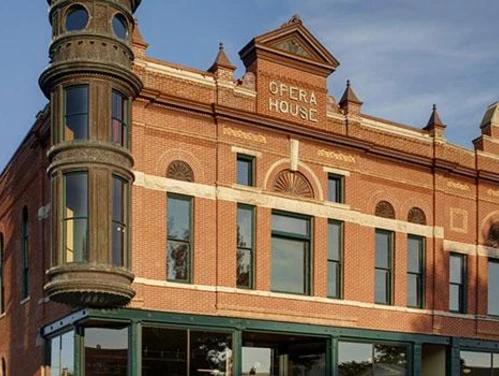The State Historic Preservation Tax Credit Program provides a state income tax credit for the sensitive, substantial rehabilitation of historic buildings. It ensures character-defining features and spaces of buildings are retained and helps revitalize surrounding neighborhoods. The program provides an income tax credit of up to 25% of qualified rehabilitation expenditures (QREs).
- State income tax credit of up to 25% of the qualified rehabilitation expenditures associated with the project
- “Qualified rehabilitation expenditures” or “QREs” means the same as defined in Section 47 of the Internal Revenue Code
- QREs generally include expenditures related to structural components of the building and some soft costs that would normally be charged to a capital account
- QREs do not include expenditures financed by federal, state or local government grants or forgivable loans unless otherwise allowed under Section 47 of the Internal Revenue Code
- Tax credits are transferable
Eligibility
Meets Historical Significance Requirements
Although the National Register of Historic Places lists structures, objects, and sites in addition to buildings, this tax credit is only available for buildings.
Building must meet at least one of the following criteria:
- Building is listed on the National Register of Historic Places or determined by the staff at SHPO to be eligible for listing
- Building is contributing to the significance of a historic district that is listed on or eligible to be listed on the National Register of Historic Places
- Building is designated as a local landmark by city or county ordinance
- Barn constructed before 1937, or a barn listed on or eligible for listing on the National Register of Historic Places
View the National Park Service database to find out a building’s National Register of Historic Places status. Find out information about how to nominate a property to the National Register of Historic Places.
Meets Substantial Rehabilitation Requirements
- For commercial buildings: Qualified rehabilitation expenditures must equal at least 50% value of the building (excluding land) before rehabilitation or $50,000, whichever is less
- For non-commercial buildings: Qualified rehabilitation expenditure must equal at least 25% of the assessed value of the building (excluding land) before rehabilitation or $25,000, whichever is less
Additional Requirements
- Rehabilitation must meet the federal Secretary of the Interior’s Standards for Rehabilitation.
- Only an eligible taxpayer may apply for the state tax credit
- An “eligible taxpayer” is defined as the fee simple owner of the property or someone having a long-term lease, which meets the requirements of the federal rehabilitation credit
- Applicant may be a nonprofit but may not be a governmental body
If you are not the fee simple owner or a qualified long-term lessee, you may apply for the tax credit if you meet all of the following qualifications:
- You qualify for the federal rehabilitation credit allowed under Section 47 of the Internal Revenue Code, and
- You have notarized, written permission from the fee simple owner indicating the owner is aware of the application and has no objection, and
- You become the fee simple owner or have a long-term lease which meets the requirements of the federal rehabilitation credit allowed under Section 47 of the Internal Revenue Code prior to entering into an agreement with the Iowa Department of Cultural Affairs
Application Process
Review Process
The State Historic Preservation Office of Iowa (SHPO) has a 90-day review period from the date a complete application for each Part is received. However, the 90-day period is not binding. For incomplete applications, the review will be placed on hold until all information is provided. At the time all requested information is received, the 90-day review period will restart. The application may be denied if any requested information is not provided. Parts 2 and 3 reviews will not start until payment of the review fee has been received.
Additionally, if the completed rehabilitation work does not meet The Secretary of the Interior’s Standards for Rehabilitation as determined by the State Historic Preservation Office, or if the applicant does not otherwise comply with the terms of the agreement, law, or regulations, tax credits will not be awarded. Awarded credits may also be subject to recapture as described in Iowa Code.
Administration
The Iowa Economic Development Authority (IEDA) administers the program in consultation with the State Historic Preservation Office of Iowa (SHPO). Funding applications, referred to as a registration round, are accepted in set periods during the year.
Resources
- ESHPO Quick Training Reference Guide
- Part 2B Historic Tax Credit Registration Webinar Recording
- Part 2B Historic Tax Credit Registration Webinar Presentation Slides
- Instructions for Submitting a Part 3 Application
- QRE Schedule
- Historic Preservation Tax Credit Program Report - 2019
- Historic Preservation Tax Credit Program Report - 2020
- Iowa Code
- Administrative Rules
